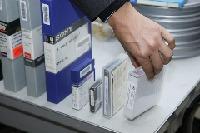Blog
Unless otherwise stated, content is shared under CC-BY-NC Licence
Digital Preservation for Every Archive
Jonathan Tilbury is CTO and Founder of Preservica based in the UK
From corporate to academic, charity to government, archives around the world are working harder than ever making sure that the events of the past year are documented for generations to come. With lessons to be learnt from this global health pandemic, and the end not quite in sight, having easy, automated, and affordable digital preservation software accessible to every archive, especially those with limited resources, has never been so important. The more people using digital preservation, the greater the benefit for all, but with this comes an increase in the number of non-expert users.
Luckily, there are a number of initiatives that will bring all these threads together to create an ecosystem that re-uses community expertise to deliver best practice digital preservation in an automated manner.
The UK Government Social Media Archive – now bigger, more comprehensive and searchable
Claire Newing is a Web Archivist at The National Archives, UK.
I’m really excited to be writing about how The National Archives (UK) has improved our social media archive. Different types of social media content are listed as either ‘Endangered’ or ‘Critically Endangered’ on the DPC ‘Bit List’ of Digitally Endangered Species so it seems like an appropriate subject for World Digital Preservation Day 2020.
We originally launched our social media archive in 2014 following a project we worked on with our former technical supplier, Internet Memory Research (IMR), to develop a method of capturing YouTube and Twitter content. My colleague, Tom Storrar, wrote about the project in detail in this post on The National Archives Blog: https://blog.nationalarchives.gov.uk/archiving-social-media/.
The UK Government Web Archive: Continuing to Capture the UK Government’s Response to COVID-19
Tom Storrar is the Web Archiving Service Owner at The National Archives.
The COVID-19 pandemic has been an unprecedented challenge for The National Archives’ Web Archiving Team. In the six months since our last blog post, we have continued our efforts to build a definitive record of the government response to the first pandemic of the digital age. Our three-pronged approach, consisting of regular in-depth archiving of core websites, complimented by broad crawls across the government web estate, working closely with our suppliers, MirrorWeb, and daily captures of interactive content with the excellent Webrecorder/Conifer tools have now matured and become routine.
This has not been without its technical challenges. With each of these “prongs” we have had to change the way we work, and rapidly: not only to working remotely, but also to new technology and to the speed with which content has been updated or published. This has prompted us to create new approaches to archiving content and to accelerate innovations that we had already started to develop before the pandemic. For example, we need to ensure that every member of the team has available to them their own version of Webrecorder/Conifer in this remote scenario. So far we have achieved this using virtual machines, which is quite a change from just a year ago, when we were taking turns capturing content from a single machine in the office!
Getting the records
Helen Dafter is an Archivist (Digital Preservation) at The Postal Museum
Before any archive can start to preserve digital records it first needs to get them into the archive. This is something I have been working on at the Postal Museum this year. It has been an exercise in advocacy and trust building as much as technical skills.
To set the scene, the Postal Museum cares for the archive of Post Office Limited (POL) and Royal Mail. It is an independent charity which has created its own challenges for this work. This blog focusses particularly on my work with POL but I hope that the processes developed will be applicable to Royal Mail in due course.
In 2018 POL developed retention schedules across the business. The Postal Museum commented on these during the project, identifying materials which needed to be offered to the archive. These provided the starting point for my approaches to POL departments to discuss the transfer of records to the archive.
Digital Preservation at the United Nations
Aleksander Gelfand is the Information Management Officer at the United Nations Archives and Records Management Section, Department of Operational Support, United Nations Secretariat in New York.
Digital preservation and media obsolescence have been issues on the minds of archivists at the United Nations since at least the 1970s. Then, information found on punch cards had to be preserved knowing that the cards themselves were not a suitable medium for preserving machine-readable information. A temporary solution was to transfer the information to computer tape, though the process was expensive and time consuming. With the increasingly introduction of new information technologies, preservation seemed a constantly moving target.
The 1980s was a decade of automation at the UN as computers running word processing and database software became ubiquitous. The UN Archives began advocating for action at the very beginning of the lifecycle of electronic records, and as a result Archives staff took a more active role in managing records rather than being a passive recipient. This, however, was easier said than done – at least initially.
The first large wave of digital records came in the form of floppy disks, which were increasingly common in collections accessioned throughout the late 1980s and throughout the 1990s. Frequently inside folders with paper records, unless properly described, these pieces of soon-to-be obsolete media could easily get lost. Nevertheless, by early 2000s, the contents of many of these disks had been migrated to external hard drives and many finding aids included descriptions indicating the presence of this digital media.
OPF at All Things Open: What we can learn from open source communities
Becky McGuinness is the Community Manager for the Open Preservation Foundation
In October, the Open Preservation Foundation attended the ‘All Things Open’ conference. Two of the themes it focused on this year were community leadership and diversity and inclusion, which are central to much of our recent and ongoing work. In this post, I’ll share some key takeaways from the event in the context of Digits: For Good, including celebrating the growth of open source, ensuring tech access for the underrepresented, the importance (and pitfalls) of community leadership, and best practices for creating a diverse and inclusive community.
In one of the keynotes, Erica Brescia, COO of GitHub, spoke about how open source has become a key driver of innovation in technology. Open source software is used in every sector and the amount of software is expected to grow exponentially in the next 10 years. As well as its increasing popularity across sectors from medicine and healthcare to memory institutions such as libraries, archives, and museums, the use of open source is expanding geographically. Five years ago, the majority of contributions came from the western world, but today, the epicentre of open source development has moved to developing nations with a huge increase in participation from India, Africa, China and Latin America. To support this growth, there will need to be more contributors, maintainers and commerce to meet demand. More importantly, there is a need for inclusive communities that support wide participation and access to essential knowledge and resources for those who are often underrepresented.
Max Communications - AIP Query Builder & Tagging
Tim Schofield is a Senior Developer for Max Communications.
Max are working with Imperial College London Archives and Corporate Records Unit (ICL ACRU) digitally preserving their documentation. We use Archivematica for digital preservation in tandem with AtoM as an access system.
The project set out to improve Archivematica’s reporting ability by developing an in-house QueryBuilder utility. The QueryBuilder enables the user to create compound queries and interrogate Archivematica’s database. For instance, searches can be run returning all packages created within a particular date-range, or packages over a certain size, or created by a particular user.
What is data integrity?
Matthew Addis is Co-Founder and CTO of Arkivum based in the UK.
What do we mean when we talk about data integrity? What is data integrity and why is it an important part of digital preservation? Data integrity means different things to different people. If you ask the question to an IT professional, compliance officer, corporate archivist, research librarian, or curator of a special collection then you will typically get very different answers. What we mean by data integrity depends on what we mean by data, how and why that data exists, and most importantly who’s using it and for what purpose. There is no single answer. But in all cases, digital preservation has a role to play in achieving data integrity, and that makes life in the digital preservation world both challenging and interesting!
WDPD 2020 - NRS Blog - Response to Covid-19
Authors: Lynn Bruce, Web Archivist; Laura Gould, Government Records Archivist; Barbara Fuentes, Web Continuity Assistant; Joanne Watson, Digital Capacity Planning Lead & Garth Stewart, Head of Digital Records Unit from the National Records of Scotland.
Introduction
In a year like no other, so many aspects of our society have changed in the wake of Covid-19; how we work, how we play, how we govern, how we live.
At the pandemic’s onset, National Records of Scotland - as keeper of Scotland’s national archive, set out to ensure that we captured a record of the unprecedented changes facing Scotland’s government and public health administrations. This required bundles of energy, focus, and engagement by colleagues, which at times significantly tested our resilience. We’ve adapted admirably to this challenge: read on to explore our key successes and thoughts on the future.
Keeping the Good for Good: Preserving the Laws of Hywel Dda at the National Library of Wales
Sally McInnes is Head of Unique Collections and Collections Care at the National Library of Wales.
When Sarah Middleton announced that the theme of this year’s World Digital Preservation Day was Digits: for Good, I could not resist the chance to talk about the Library’s approach to preserving one of Wales’s most iconic manuscripts, namely the Boston Manuscript of the Laws of Hywel Dda (the Good). The Library has combined innovative approaches in traditional conservation, digitisation and digital preservation to ensure that these Welsh Laws are accessible now and in the future.
The Boston Manuscript was purchased in 2012 by the Library with assistance from the Lottery Heritage Fund, the Friends of the National Libraries and the Welsh Government. The manuscript, written in Welsh, dates from around 1350 and records the native Welsh laws, which were thought to have been codified by Hywel Dda. It is a key text in the history of Welsh law and provides insights into Welsh identify and cultural life. It was used as a working text, being annotated by a Judge in South Wales, who carried it around in his pocket. By the 19th century, the manuscript had reached America and was in the custody of the Massachusetts Historical Society in Boston, having probably been taken across the Atlantic by an emigrant.



















































































































































